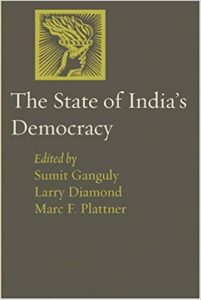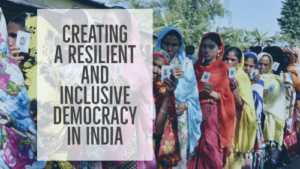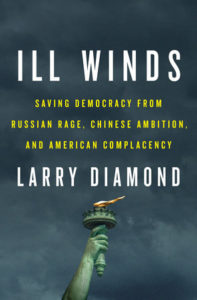Asian democracy is facing a “dystopian future” as scaling back in U.S. engagement and leadership is empowering forces that undermine democratic norms and processes.
The warning came as Asian democracy advocates issued an urgent appeal for solidarity with the students of Hong Kong.
We notice that Carrie Lam has adopted a more repressive approach towards Hongkongers since she returned from Beijing, said a joint statement of the Pro-Democracy Camp, the Asia Democracy Network reports. It has led to such worsening of situation in Hong Kong. Beijing’s power to direct the Chief Executive, as it claims, must come with responsibility.
Asia’s largest democracy is far from immune to illiberal and authoritarian trends, observers suggest.
 Indeed, India’s prime minister, Narendra Modi, is “the biggest threat to the future of global liberal democracy,” the FT’s Edward Luce writes:
Indeed, India’s prime minister, Narendra Modi, is “the biggest threat to the future of global liberal democracy,” the FT’s Edward Luce writes:
His abrupt decision in July to cancel the constitutional autonomy of Kashmir, India’s only Muslim-majority state, cut off its communications and place its political leaders under house arrest has not been heard by the Supreme Court. India’s judiciary used to have clout. It is now as tame as the courts in Hungary.
But some of the country’s leading intellectuals are sounding the alarm, his FT colleague Gideon Rachman adds. Amartya Sen, a Nobel Prize-winning economist now resident in the US, told The New Yorker magazine that his friends are reluctant to criticise the government on the phone, adding, “People are afraid. I’ve never seen this before.” Alarmed by the increasingly compliant judiciary (and much of the media), Pratap Bhanu Mehta, an eminent Indian academic, has written that: “The noose is tightening around all independent institutions in India.”
 The west’s fear of China means that it is likely to continue to give Modi’s India a free pass for some time, Rachman observes:
The west’s fear of China means that it is likely to continue to give Modi’s India a free pass for some time, Rachman observes:
But a failure to talk openly about the failings of the Modi model is not cost-free. The danger is that the west is embracing a comforting illusion — that democratic India will act as an ideological bulwark against authoritarian China. The reality is that India’s slide into illiberalism may actually be strengthening the global trend towards authoritarianism.
![]() The Freedom in the World 2019 report from the independent watchdog organization Freedom House records the 13th consecutive year of global declines in political rights and civil liberties. These troubling developments are also manifested throughout the Asia-Pacific, where continuous scaling back in U.S. engagement and leadership is raising doubts about American power and purpose in the region, empowering forces that undermine democratic norms and processes, Noa Ronkin writes for Stanford’s Freeman Spogli Institute.
The Freedom in the World 2019 report from the independent watchdog organization Freedom House records the 13th consecutive year of global declines in political rights and civil liberties. These troubling developments are also manifested throughout the Asia-Pacific, where continuous scaling back in U.S. engagement and leadership is raising doubts about American power and purpose in the region, empowering forces that undermine democratic norms and processes, Noa Ronkin writes for Stanford’s Freeman Spogli Institute.
“This is an existential moment for global power structures, turned upside down by technology. When journalists globally are under attack, democracy is under attack.” With these words, the internationally-esteemed investigative journalist and press freedom champion Maria Ressa opened her keynote address upon receiving the 2019 Shorenstein Journalism Award.
 As CEO and executive editor of Rappler, she has led the Philippine independent news platform in shining critical light on the Duterte administration’s drug war and unprecedented number of killings in the country, Ronkin adds “Our dystopian present is your dystopian future if nothing significant is done,” she cautioned.
As CEO and executive editor of Rappler, she has led the Philippine independent news platform in shining critical light on the Duterte administration’s drug war and unprecedented number of killings in the country, Ronkin adds “Our dystopian present is your dystopian future if nothing significant is done,” she cautioned.
She was joined on the 18th annual Journalism Award panel by Stanford’s Larry Diamond, author of Ill Winds… and co-director of NED’s International Forum, and Raju Narisetti, director of the Knight-Bagehot Fellowship in Economics and Business Journalism and professor of professional practice at Columbia Journalism School. Watch Ressa’s keynote and the entire panel proceedings (above). RTWT







